- Home
- Anthony McGowan
Shark Adventure
Shark Adventure Read online
ANTHONY McGOWAN
Illustrated by David Shephard
PUFFIN
Contents
Map
1. The Turtle’s Story
2. Seasick Amazon
3. Flying Again
4. The Guide
5. Exploring Nuku Hiva
6. The Falls, and a Slippery Surprise
7. Good and Bad Luck
8. All Aboard the Tian-long
9. The Catch of the Day
10. Matahi the Hero
11. Sickbay
12. A Meal to Remember
13. They Reach the Island
14. Into the Lagoon
15. Happy Landings
16. Huru Huru
17. Settling In
18. First Trip to Turtle Beach
19. Getting Comfy
20. Trouble in the Lagoon
21. Save the Dolphins
22. The Unlikeliest Saviour
23. An Encounter with an Alien
24. The Bluey Blues
25. The Hatchlings
26. Attacked from Above
27. The House of Huru Huru
28. Shots in the Dark
29. Two Gifts
30. Crime and Punishment
31. Machete!
32. Bluey
33. The Return of a Warrior
34. The Sting in the Tail
35. Party Poopers
36. Rude Awakening
37. The New Queen of Uva’avu
38. Amazon’s Beach
39. Hurried Departures
40. Trapped
41. Strange Fruit
42. The Tempest Rages
43. The Fragile Ark
44. Crusoes
45. The Rope Trick
46. The Unexpected Visitor
47. The Perilous Voyage
48. Shark Battle
49. Payback
50. Reunited
Epilogue
PUFFIN BOOKS
Anthony McGowan is a multi-award-winning author of books for adults, teenagers and younger children. He has a life-long obsession with the natural world, and has travelled widely to study and observe it.
Books by Anthony McGowan
LEOPARD ADVENTURE
SHARK ADVENTURE
To the wonderful people and astonishing wildlife of the remote islands of Polynesia
Her ancestors had been doing this for a hundred million years: returning to the same isolated beaches to lay their eggs. Those ancestors had shared the ancient seas with long-necked plesiosaurs, fast-swimming ichthyosaurs and the terrifying mosasaurs, built like monumental crocodiles, with jaws capable of engulfing a fully grown leatherback turtle, whole.
She herself had made this journey a hundred times. Now she was tired. So tired. She would not come to this beach – or any other – ever again. And the knowledge that this was her last time gave extra urgency to the long, slow beating of her flippers.
She found the familiar gap in the reef and entered the calm lagoon. She surfaced and saw above her the great canopy of stars, like frozen fireworks. Soon she felt the sand on the underside of her shell, and began to drag herself up the beach. So graceful in the water, on land she was ungainly and awkward, moving as if carrying a great burden, and it was not long before she reached a point beyond exhaustion.
But she had to make it past the high-tide mark or her eggs would be swamped and lost; and so on she went. At last she found a place where the white coral sand was untouched by the waves, and she began to dig, pushing down with her back flippers and flicking the sand out in all directions, like a garden sprinkler.
It took her almost an hour, but finally she was content with the depth of the hole, and she began to lay. It took her another hour to fill her nest with the hundred and fifty eggs. When it was over, she pushed back the sand. It was still dark, but there was a slight lightening in the east as she hauled herself back to the warm sea.
The ache in her stomach told her that she hadn’t eaten for a long time, and she thought it would be good to swim through a swarm of jellyfish, munching away. Their stings couldn’t hurt her, and the soft bodies were easy on her old jaws. She moved serenely through the gap in the reef, her front flippers beating the water like leathery wings, and she sensed the bottom fall away to the dark, cold depths.
And then she felt something else. A movement, dark against the dark. Something huge, and deadly, and without pity.
She had fought sharks before. She knew where they were vulnerable. Her sharp, hooked beak could inflict serious damage on a shark’s gills. And her sheer bulk – she was two metres long and weighed more than 700 kg – made her a surprisingly formidable foe. And, besides, she was too tired to run. So she took a last gulp of air, and thinking perhaps of the tens of thousands of eggs she had laid, of the many thousands of young who had struggled down to the water, of the few who had made it through to adulthood, she dived to face the shadow as it rose.
Amazon Hunt was dying. Absolutely, definitely dying. There was a savage beast trying to burst out of her skull, and she writhed and twisted as if electric currents were being passed through her body. She was consumed by nausea so intense that even her fingertips felt sick. The wooden walls surrounding her heaved and moved like they were alive. She was convinced that those walls hated her, and she hated them back.
In her hand she clutched her most prized possession: the red neckerchief with white spots given to her by her mother years earlier, before Amazon was sent to boarding school. It gave her some comfort. But not enough.
‘I’m dying,’ she moaned through dry, cracked lips.
‘You’re not dying,’ sighed her cousin, Frazer Hunt, for the hundredth time.
‘I am so dying. Pass me the sick bucket.’
‘You don’t need the sick bucket,’ said Frazer, as patiently as he could. He might also have added that the sick bucket was full, but he tactfully refrained. ‘What you need is some fresh air. Come on, I’ll help you up on deck.’
‘It’ll be like a holiday,’ Amazon’s Uncle Hal had said, as they waited in the departure lounge at Vancouver Airport.
They were in Canada to search for Amazon’s mother and father, whose light aircraft had gone missing in highly suspicious circumstances somewhere in the wilderness.
‘I don’t want a holiday. I want to help you find my mum and dad,’ Amazon had pleaded.
But Hal Hunt’s logic had been remorseless, and a little brutal.
‘I understand that, Amazon,’ he had said. ‘But, frankly, you’re more of a hindrance than a help – you are only thirteen, remember. We would have to divert resources to take care of you. Resources that could be better employed on the search.’
Hal Hunt, his grizzled hair cut short, military style, wasn’t someone you argued with. He was the undisputed head of TRACKS – the Trans-Regional Animal Conservation and Knowledge Society – and he was used to getting his way. Despite being almost sixty years old, he still gave off an aura of strength and determination.
But Amazon knew that there was a core of kindness underneath his hard exterior.
‘Besides, after what you’ve been through in Siberia these last few weeks, you’ve earned a place on another TRACKS mission,’ he ad
ded.
Amazon had learned a lot about both herself and the wide world in the few weeks since she had been whisked from Millbank Abbey, her pretty but dull boarding school in the English countryside, and taken to the TRACKS HQ on Long Island in the United States.
The plan had been to meet her parents, Ling-Mei and Roger, there. This was a miracle in its own right. The brothers Hal and Roger Hunt had not spoken for many years. Although they were both dedicated to saving animals and preserving the natural world, and had set up TRACKS together, they differed over the direction that the organization should take. Hal wanted to expand its reach and power by taking on corporate sponsorship and funding from governments; Roger preferred to keep the operation small and flexible and, crucially, independent.
Hal won the argument, and so TRACKS had developed into a well-resourced and powerful organization, able to send teams of young environmentalists – the Trackers – around the world on emergency projects and longer conservation programmes.
The split became a family feud that had lasted long enough for Amazon never to have met her cousin Frazer, Hal’s son. That all changed the day he helped her climb in through her dormitory window at Millbank and brought her back to the TRACKS HQ in America.
Her parents were supposed to have some vitally important information about TRACKS. It was information they had not been able to impart, for, when Amazon reached Long Island, she found out that her parents’ light aircraft had gone missing in the west of Canada, and Hal Hunt was leading a rescue mission to find them.
Partly to keep Amazon’s mind off this, she and Frazer went on an expedition to help save one of the world’s rarest big cats – the Amur leopard – in the remote forests of Siberia. It was a mission that led them all into incredible danger at the hands of poachers, and at the claws of a fearsome Siberian tiger.
‘This is going to be so cool!’ chipped in Frazer. ‘I’ve always wanted to go to a South Sea island. Think of it, Zonnie – white sand, blue skies, coconuts –’
‘I don’t like coconut.’
‘Don’t be silly – everyone likes coconut.’
‘Well, I don’t.’
‘OK, but I bet you’ve never tried fresh coconut milk, straight from the shell, have you? I don’t mean from one of the brown coconuts you see here in the supermarket – I mean from a fresh green coconut that’s just fallen from the tree.’
‘No, and I don’t suppose you have, either.’
‘True, but I’ve heard it’s the greatest tasting drink in the universe, and –’
‘OK, son,’ said Hal Hunt, ‘I think that’s enough about coconuts.’ His voice then softened as he turned to Amazon. ‘Your father, Roger, and I had our differences, but he’s my brother, and I love him. I’m going to find him and your mother, and bring them back to you. But while I’m doing it there are some incredibly endangered animals that need you.’
That was the clincher, for Amazon. Even before she had become a Tracker she had loved animals obsessively.
‘What is it that we’re saving this time?’ she asked, and Frazer knew that she was hooked.
‘Leatherback turtles. One of the rarest species of sea turtle. They just nest in a few island beaches around the Pacific. The one you’re going to is one of the most important, and it just so happens that the head man there is an old friend of mine and your father’s, although I haven’t heard from him in a long, long time …’
For a few moments Hal Hunt’s eyes became misty, as he lost himself in memories of old adventures. And then he shook his head, and was back in the present, with urgent work to be done.
‘The trouble is,’ he continued, ‘that when the eggs hatch out, most of the babies get picked off by predators before they even reach the sea. Your job is to watch out for when they hatch, and get them down to the water. You do that and you give the species a real boost. You think you’re up to it?’
Amazon chewed her lip.
Turtles.
Baby turtles.
Baby turtles that needed her help.
She nodded.
Hal Hunt smiled. It wasn’t something he did a lot. ‘That’s great, Amazon. And you can have Bluey along to babysit – er, I mean help you out with the mission.’
Bluey was a happy-go-lucky, carrot-topped Aussie in his early twenties. He had been part of the mission to save the Amur leopards. His real name was Ross Taylor, but everyone called him Bluey. He was Frazer’s best friend in TRACKS.
Bluey’s presence was the icing on the cake for Frazer, and he couldn’t contain himself any longer. He whooped and cheered.
‘This is one trip you are never going to forget.’
And so it was that Frazer and Amazon, accompanied by the laid-back figure of Bluey, had found themselves on another of the seemingly endless journeys that were part and parcel of life as a member of TRACKS.
From the damp and chill of Vancouver they had flown to a sunny LA. From LA they took a seven-hour flight to Tahiti, landing at Faa’a International Airport near the capital Papeete. Amazon slept for most of the flight over the Pacific, and Tahiti was shrouded by cloud as they came in, so she and Frazer had no real sense of where they were.
‘Shame about the cloud,’ said Bluey ruefully, as they filed sleepily off the plane. ‘We just missed the second most spectacular sight in the whole of the Pacific. Giant volcanoes, huge waterfalls …’
Amazon used her imagination to conjure up the volcanoes and waterfalls, painting the vivid greens and frothing white water in her mind, but she still longed for the real thing.
After two and a half hours of watching the rain thrum against the airport windows, they boarded their flight to Nuku Hiva, the biggest island in the Marquesas group. Almost all of the other passengers in the small jet were Polynesians. Dark-haired, with light brown skin, some were young and attractive, others older and very much larger.
‘Being super-sized is a mark of success in this culture,’ Bluey whispered to Amazon, who was staring at a man so fat he flowed like lava over two seats. ‘The King of Tonga – another island to the west of here – used to be the world’s heaviest monarch – he weighed two hundred kilograms; what’s that, about six of you, Zonnie?’
Young and old, fat and thin alike, had red and white flowers in their hair, which Amazon found very charming.
The colour and variety inside the plane were not matched by anything visible through the small windows. The Pacific is the world’s greatest ocean, and for much of it there is nothing to see except the sea. And so, after a spell of gazing at the limitless expanse of blue, Amazon fell asleep again.
Frazer nudged her awake as they circled above their destination. Amazon quickly checked her chin – she’d got to know Frazer quite well in the few weeks since they’d first met, but that didn’t mean she wanted him to see her with sleep-drool on her face.
‘You don’t want to miss this,’ he said, nodding towards the window. ‘Remember how Bluey said that the view you get when you come in to land in Tahiti is the second greatest in the world?’
‘I think he just said the Pacific …’
‘Don’t nit-pick, Zonnie. Well, anyway, I think he meant that this is the greatest.’
And then, finally taking in what was below them, she let out a gasp.
‘I really hate it when the best you can say is “wow”,’ she said. ‘But, well, wow!’
It was indeed a ‘wow’ view. The grand images of Tahiti that her imagination had cooked up were dwarfed by the reality of the Marquesas. High, jagged peaks, like broken green teeth, reached up into the clouds; insanely steep valleys cut their way down to the shore, where huge waves crashed into the rocks.
‘It�
�s still not exactly those blue seas and palm trees and sandy beaches …’ said Amazon.
‘Nah,’ agreed Frazer. ‘This is more the sort of island where you’d expect to see King Kong fighting with a dinosaur or something.’
Bluey leaned over from across the aisle.
‘Like pretty well all the islands of the South Pacific, the Marquesas started life as volcanoes. Some of the others, like the Hawaiian islands, are still active, but these guys are a little older – one or two million years. That’s given time and wind and water the chance to carve out those peaks and valleys. Cool, huh?’
‘How come you know all this stuff, Bluey?’ asked Amazon. With his long red hair and easy charm, Bluey came across like a laid-back beach bum.
‘I’m halfway through my PhD on the marine life of the South Pacific,’ he replied, grinning. ‘That’s how I got this gig.’
‘Our Bluey’s not just a pretty face,’ laughed Frazer, for which Bluey gave him a playful thump.
‘Is this where the turtles are?’ Amazon asked.
‘No. As you observed, Zonnie, the Marquesas don’t really have the sort of beaches turtles need for their nests – they bury their eggs in the sand. I’m afraid our journey’s only just begun, really.’
‘You’re kidding? I feel like we’ve already travelled halfway round the world.’
‘We have – or about a third of it. The last leg is shorter, but trickier. We have to get to a coral island called Uva’avu. It’s in the Disappointment Islands, a few hundred miles south of the Marquesas. It’s a three-day boat ride. If we find the right boat …’
‘Am I going deaf or did you just say the Disappointment Islands?’ said Frazer incredulously.
‘You got it. The Îles du Désappointement, the French call them – and remember this bit of Polynesia is all technically part of France.’

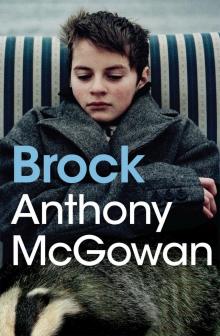 Brock
Brock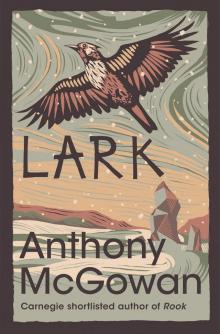 Lark
Lark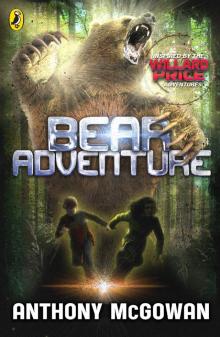 Bear Adventure
Bear Adventure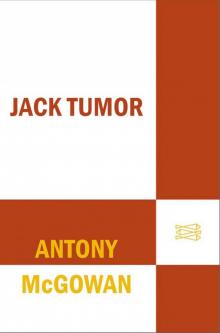 Jack Tumor
Jack Tumor Einstein's Underpants--And How They Saved the World
Einstein's Underpants--And How They Saved the World The Bare Bum Gang Battles the Dogsnatchers
The Bare Bum Gang Battles the Dogsnatchers The Bare Bum Gang and the Football Face-Off
The Bare Bum Gang and the Football Face-Off The Knife That Killed Me
The Knife That Killed Me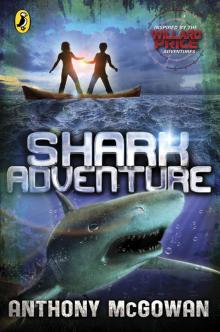 Shark Adventure
Shark Adventure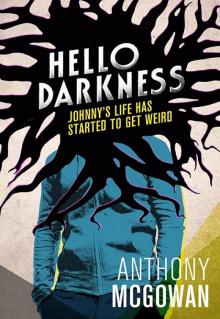 Hello Darkness
Hello Darkness The Bare Bum Gang and the Holy Grail
The Bare Bum Gang and the Holy Grail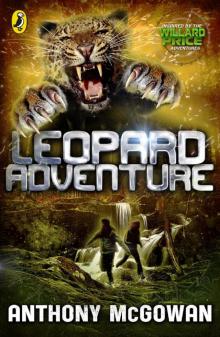 Leopard Adventure
Leopard Adventure The Bare Bum Gang and the Valley of Doom
The Bare Bum Gang and the Valley of Doom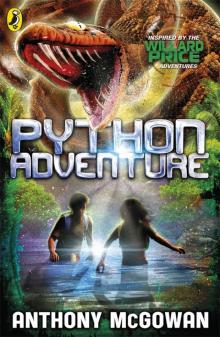 Python Adventure
Python Adventure